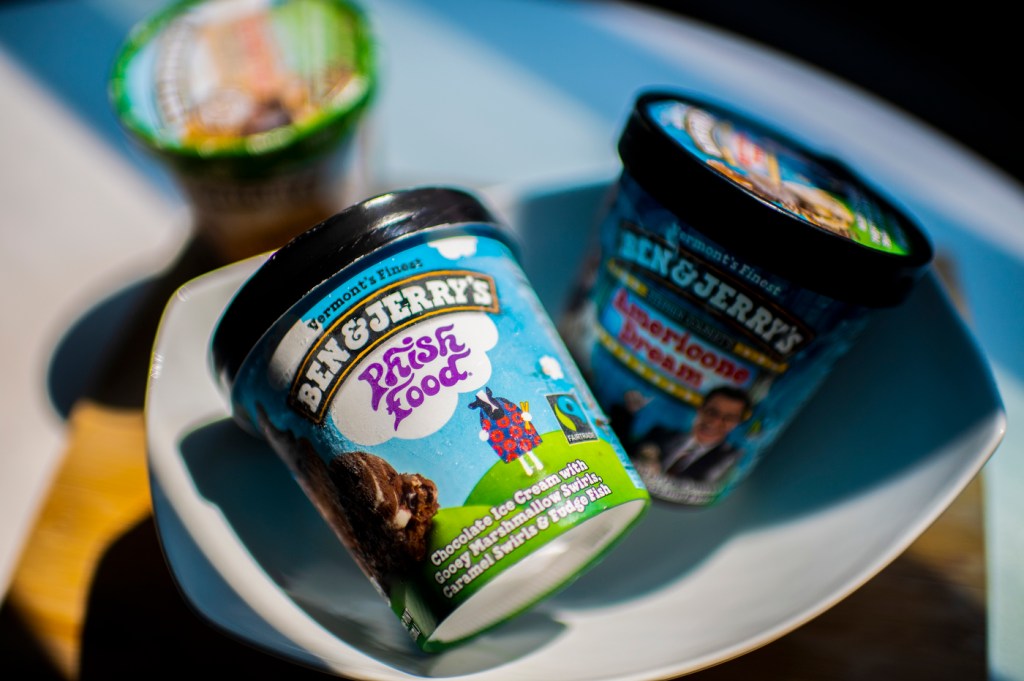Did Ben & Jerry’s make the right call by deciding not to sell ice cream in the West Bank?

This week, Ben & Jerry’s—famous for its unique ice cream flavors as well as its outspokenness on social issues—waded into its most contentious debate yet, announcing that it would stop selling ice cream in “occupied Palestinian territory” in the West Bank. The decision was controversial, but it’s unlikely the company had any choice whether to take a stand, says Yakov Bart, associate professor of marketing at Northeastern.

Yakov Bart is an associate professor of marketing and the Joseph G. Riesman Research Professor in Northeastern’s D’Amore-McKim School of Business. Photo by Matthew Modoono/Northeastern University
The move garnered immediate and intense debate from consumers: applause from pro-Palestine consumers and ire from their pro-Israel counterparts, as well as backlash from Israeli prime minister Naftali Bennett. In its announcement, Ben & Jerry’s said it wouldn’t pull out of Israel altogether, vowing to stay in the country “through a different arrangement.” Unilever, the parent company of Ben & Jerry’s, also announced on Thursday that it remains “fully committed” to doing business in Israel.
“Taking a strong position on a fraught issue such as Israel and Palestine is a much riskier move than perhaps some of its other stances,” says Bart, who studies the effect of social media on marketing and is the Joseph G. Riesman Research Professor in Northeastern’s D’Amore-McKim School of Business.
“On the other hand, because Ben & Jerry’s is famous for taking a stand in other social movements, not taking a position on this one would also have been a strong message to consumers,” he says.
What do you make of Ben & Jerry’s decision to wade into this issue?
It’s becoming harder for brands to stay away from political and social debates because we’re seeing a shift in consumer behavior, especially in younger generations. People care about what brands stand for.
Ben & Jerry’s has always been a brand that stood up for social movements, including Black Lives Matter, reparations for African Americans, and LGBTQA+ issues. Their whole brand positioning has always included spending parts of their marketing budget aligning with social movements. So, the fact that they made an announcement on Israel-Palestine isn’t surprising.
Taking a strong position on this issue was much riskier, though, because there are well-respected and knowledgeable groups that support both sides.
It seems that some brands “get it right” when it comes to social positions, and others don’t. Why do some announcements create more ire than others?
Anytime a brand has decided to pursue a social or political issue, the questions always become how and when.
Take Victoria’s Secret, for example: The company recently announced that it would start including women of varying shapes and sizes in its marketing and runway shows. But Victoria’s Secret has never been a brand that was famous for standing up for social issues, and so the announcement fell flat; a lot of people felt that it was pandering, rather than authentic.
Another good example of bad marketing was Pepsi’s commercial with Kendall Jenner, which showed her emerging from a crowd of protesters to hand a can of soda to a police officer. It aired during a particularly intense time of demonstrations against police violence and calls for racial justice in the U.S. That one was a disaster. [Pepsi pulled the ad shortly after it was published on YouTube, after widespread derision and criticism of its purported message.]
What we see time and again is that it’s one thing for companies to react quickly and another for them to react well. People can tell when something is inauthentic or reactionary.
How do brands decide when and how to weigh in on something, then?
Brands have to do a lot of research to collect information about how attitudes may be shifting among their consumers. After all, people who go on social media and voice their opinions might not be representative customers of the brand. What you see on social media are people who’ve taken a more extreme position one way or the other, but a lot of these conversations are still happening offline.
But ultimately, it’s always an issue of fit: Does this make sense for the brand? For Ben & Jerry’s, the fit was there—they have a long history of advocating for social and political issues; this was just high risk no matter what.
In their case, the company had to weigh the risks of taking action vs. not taking action. So, even if the decision means that ice-cream sales drop in the U.S., it doesn’t mean that they made the wrong choice because they had to consider what would happen if they did nothing instead. And they might have decided that that would have been a worse outcome.
You mentioned earlier this shift in consumer behavior—people, especially younger people, seem to expect more from the companies they support than just good products. How do brands balance that expectation with their own bottom line?
This is something that each brand needs to shake out on its own, and whether to be associated with social movements or not is a decision that has different consequences.
If your brand identity is not associated with social action, your consumers might not be as passionate, but you’re also not going to have consumers that are passionately hating you, either.
On the other hand, if you try to associate with social activities, the loyalty of some consumers is going to be deeper, but you may be losing other segments of consumers, so appeal is not as broad.
And then there are some large, national brands that are just convenient, and the price is right, so people may buy the products without worrying too much about the brand values.
But, for a small company like Ben & Jerry’s that made its whole story about social activity, it’s not possible to be a brand that doesn’t care about social issues, even if it wanted to. It’s possible for brands to become more socially active over time, but much harder to become less. That’s the situation Ben & Jerry’s found themselves in: Ignoring the issue without angering customers was impossible.
For media inquiries, please contact Shannon Nargi at s.nargi@northeastern.edu or 617-373-5718.





